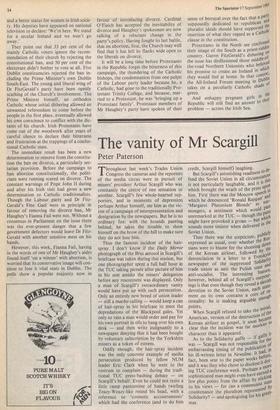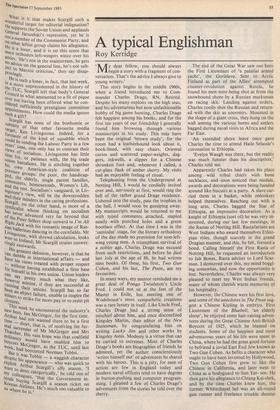The vanity of Mr Scargill
Peter Paterson
Throughout last week's Trades Union 1 Congress the cameras and the reporters of the media circus were in pursuit of miners' president Arthur Scargill who was constantly the centre of one sensation or another. Scargill's few whole-hearted sup- porters, and in moments of depression perhaps Arthur himself, see him as the vic- tim of a campaign of misrepresentation and denigration by the newspapers. But he is no ordinary fox: with the hounds panting behind, he takes the trouble to show himself on the brow of the hill to make sure they do not lose him.
Thus the famous incident of the hair- spray. I don't know if the Daily Mirror photograph of the Brut aerosol in Scargill's briefcase was taken during this session, but one photographer spent a full half hour at the TUC taking picture after picture of him in his seat amidst the miners' delegation before any resentment was displayed. Only a man of Scargill's extraordinary vanity would have put up with such persecution. Only an entirely new breed of union leader — still a macho calling — would keep a can of hair-spray in his briefcase to meet the depredations of the Blackpool gales. Yet only so vain a man would order and pay for his own portrait in oils to hang over his own desk — and then write indignantly to a newspaper denying that it had been bought by voluntary subscription by the Yorkshire miners as a token of esteem.
Oddly enough, the hair-spray incident was the only concrete example of media persecution produced by fellow NUM leader Eric Clark when he went to the rostrum to complain — during the tradi- tional TUC press-bashing debate — on Scargill's behalf. Even he could not resist a little camp pantomime of hands twirling Teazy-Weazy-like round his head, with a reference to 'cosmetic accoutrements' which had the conference (and to do him credit, Scargill himself) laughing.
But Scargill's astonishing readiness to de' fend the Soviet Union in all circumstance,s is not particularly laughable, and it is th's which brought the wrath of the press 013°;° him. First there was the Moscow sPeccii„Idri which he denounced 'Ronald Raygtd 'Margaret Plutonium Blonde' as via'. mongers, a sentiment which would pass unremarked at the TUC — though the PIT might have provoked a groan — but +NW,' sounds more sinister when delivered in the Soviet Union. Then there was the scepticism, Pob,li.,c1,Y expressed as usual, over whether the sians were to blame for the shooting del, of the Korean airliner, followed bY t". denunciation in a letter to a Trotskrs' newspaper of the suppressed SolidarttYd trade union as anti the Polish state an anti-socialist. The interesting feature, however, behind all of Scargill's outPen.1 ings is that even though they reveal a slavis devotion to the Soviet Union, eachae • ment on its own contains a core 01 ra-
tionality: he is making arguable enotiP points.
When Scargill refused to take the tial American, version of the destruction of the Korean airliner as gospel, it soon bectirr!a clear that the incident was far mu character than it appeared. rkier As to the Solidarity gaffe — if gaffe it was — Scargill was not responsible for t,.f embarrassing timing of the publication (.'r his ill-written letter in Newsline. It had, fact, been sent to the paper weeks belor''' inie, and it was they who chose to disclose it dur- ing TUC conference week. Perhaps a ntt]rea sophisticated man might even have carnet' few plus points from the affair by sticking to his views — for can a communist state countenance the pluralism represented bY Solidarity? — and apologisingfor his grain' mar. What is it that makes Scargill such a wonderful target for editorial indignation? He supports the Soviet Union and applauds General Jaruzelski's repression, , yet he is
a member of the Communist Party, and no other leftist group claims his allegiance. He is a loner, and it is on this score that more orthodox left-wingers wince over his antics. 'He's not in the mainstream, he gets !10 advice on the general line, he's notsub- ject to Marxist criticism,' provingly. they say chsap- . He is such a loner, in fact, that last week, in a move unprecedented in the history of the TUC, Scargill left that body's General Council in what amounted to a fit of pique Over not having been offered what he con- sidered sufficiently prestigious committee
appointments. How could the media ignore such a gift?
Scargill has none of the bonhomie or subtlety of that other favourite media target, Ken Livingstone. Indeed, for a foretaste of the kind of squabble which could be rending the Labour Party in a few Years time, one only has to contrast their
views of socialism. Livingstone has little time for, or patience with, the big trade anion battalions. He is stitching together his own American-style coalition of Pressure groups: the poor, the handicap- ped, the elderly, single parent families, commuters, homosexuals, Women's Lib, and the rest. Socialism's vanguard, in Liv- ingstone's view, will be the downtrodden and their minders in the caring professions. Scargill, on the other hand, is more of a has whose thinking on socialism bas never advanced very far beyond that of. the Peter Sellers shop steward in I'm All Right Jack with his romantic image of Rus- sia n ballerinas dancing in the cornfields. Mr Livingstone, with shrewd calculation, looks ‘v.est to Ireland; Mr Scargill strains unswervingly eastwards. His greatest delusion, however, is that he .can dabble in international affairs — and have .his views treated with proper respect Withoutthout having established a firm base for himself in his own union. Union leaders Can say pretty much what they like, however asinine, if they are successful at running their unions. Scargill has so far miners an abject failure, unable to inspire the tiers to strike for more pay or to resist pit closures. This week he encountered the industry's new boss, Ian McGregor, for the first time. A.. rthur had not wanted there to be a first — short, that is, of receiving the for- Mal surrender of Mr McGregor and Mrs Thatcher His vain hope was that coalfield .militancy would have enabled him to boYcott McGregor, as the TUC, until last week, had boycotted Norman Tebbit. Bu.t It was Tebbit — a waggish character despite his appearance — who was quick to "Won Arthur Scargill's silly season. 'I want to deny categorically,' he told one of ItnY colleagues, 'that the Government in- ends buying Scargill a season ticket on
Korean Airlines. He's much too valuable to us where he is.'







































 Previous page
Previous page